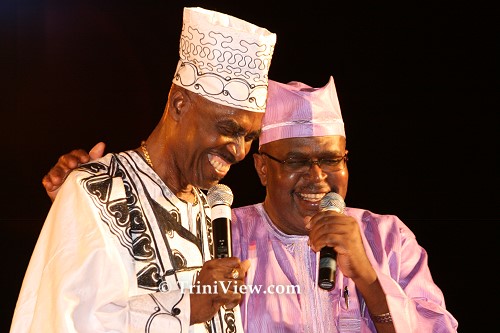|
|
The Mighty Duke Speaks
 The Mighty Duke and Phil Simmons
The Mighty Duke and Phil Simmons
TriniSoca.com Reporters
Recorded: on September 27, 2007
Posted: October 03, 2007
< Prev | 01 | 02 | 03 | 04 | 05 | 06 | Next >
TRINISOCA.COM: In terms of your singing career, at what point did you make your debut into the Calypso world?
DUKE: In the late fifties. I had a very good friend whose name was 'Syncopater' and he was a very good Calypsonian. He lived next door to me and at the time he was singing Calypso. As a matter of fact, the year when 'Sparrow' won "Jean and Dinah" I think he placed third. He encouraged me in a sense because he knew I liked singing. He used to hear me singing other people's songs. I remember him saying to me, "Why don't you try and write?" and I did. When I used to give him my ideas and so on he used to say, "You sing that for yourself!" and I did. That was how I started composing and singing.
Tent-wise, there were some young guys who had a Calypso tent in Point Fortin at the time and, of course, they asked me to come and join them, and I did. We had guys like 'Impressor', 'Blacks' and others, but most of them are no longer with us. I am talking about in the fifties when I started with these guys in Point Fortin. That was my beginning.
TRINISOCA.COM: What were some of the topics of some of those earlier songs?
DUKE: I always liked humour. I remember doing one in the early days called "Woman Sideline" and that was very popular. There was another song I did called "Know Your Friends". I also did "E is for Eric" because remember around the late fifties was the advent of Dr. Williams. I did a few songs that were quite popular in Point Fortin at that time but I cannot remember the names right now.
TRINISOCA.COM: Politically, that was before the advent of Independence. What was the mood of the people and what was the mood of the Calypsonians?
DUKE: The mood of the Calypsonians was as it is now. Each one had their own different views and most of them did what they wanted to do. The Calypsonians sang on topics about life, woman, man, family life, relationships and government. There wasn't any particular trend towards political songs or whatever. Each Calypsonian gave their own opinion on what they were singing. There were the serious ones and there were the humorous ones at that time. Back then, it wasn't like how it is now where you find guys are taking a political side.
TRINISOCA.COM: What would you say is the role of the Calypsonian in today's society?
DUKE: He has the very same role he always had. His role is to inform, to educate and to speak out when others are afraid to. It may not be as effective as it used to be because remember in today's society in terms of information people can get it through the media, internet and so on. With all of that a Calypsonian can still say what is happening around him through his song. If he thinks it out carefully and he is satisfied with what he is saying, it may go with what other people are thinking, but they are just afraid to speak about it.
TRINISOCA.COM: What are some of the challenges that you have encountered in your career?
DUKE: I encountered a great many challenges. People try to dictate to you what you should sing and what you shouldn't sing about and that is one of the challenges. It is a serious challenge for the artistes who tell you what they think. But you shouldn't tell people what they want to hear. Let people hear what they want to hear for themselves. You tell them how you see things. The true artiste sees things through a different eye to a civilian. We see things differently most times. People shouldn't dictate to you how you should think. You let know how you think. You must be free, therefore, your thoughts must be free.
TRINISOCA.COM: And certainly the early Calypsonians weren't as well paid as the contemporary Calypsonians.
DUKE: Yes and no. A very important thing I have to say here is that Calypso around my time was never about money. We never thought about making money. We thought about what we were doing. We did it for the love of the art and when money came that was fine. Making more money, I would say yes. But money was not the objective as it is today. The young guys today make much more money than we ever dreamed of. But then again, that time changed. I guess it goes with the times.
Continue...
< Prev | 01 | 02 | 03 | 04 | 05 | 06 | Next >
|

|